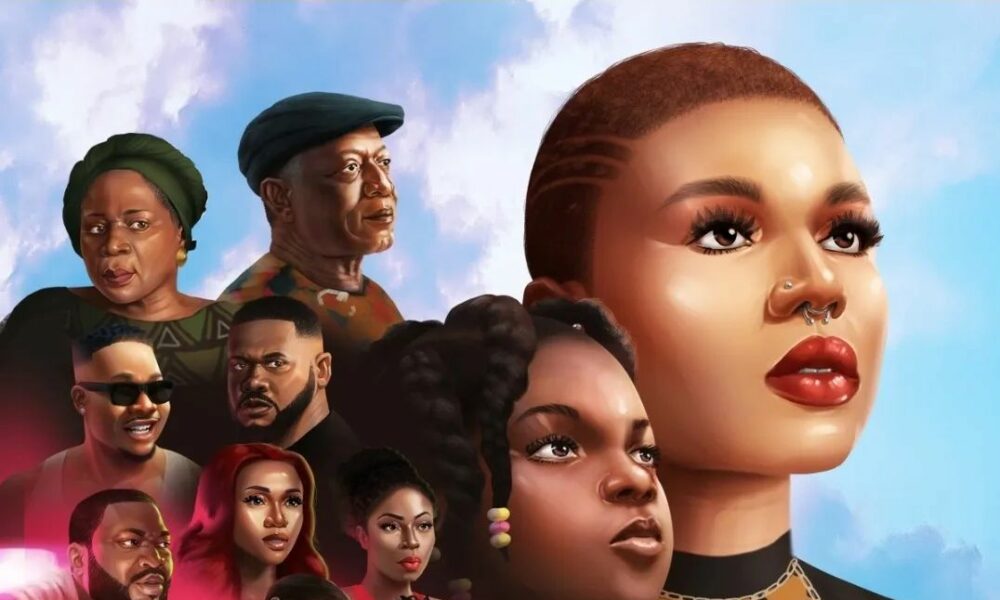Rarely does a critic write about the drudgery of being stuck in traffic while going to the cinema and coming back home to friends, girlfriends, boyfriends, and parents’ stares who still sigh when the thought of the job you do hits them: Film Critic.
Without a deadline to meet, the critic ideates while seeing a movie: taking mental notes alternating camera movement; the upsurge of plot and subplot; fragments of information a scene hoards — the critic’s mind is in permanent labour. And, while lovers exchange smiles and promises in muffled voices, a working critic barely has time for those exclusive acts. An unspoken law makes critics growl in protest when booking a ticket takes long. Unlike another cinephile in the viewing room, a critic has no liberty of taking a cursory walk to the toilet— important scenes may be lost. Despite having foreknowledge of these, I arrived a few minutes late at the cinema for Obara’M; a few frames have been lost. But, Nollywood being Nollywood, with heavy reliance on glamour and casual attention to characters’ psychological development, nothing was truly lost.
- Advertisement -
Despite creating creative jobs, and a haven for Nigerian youth, Nollywood still suffers from a paucity of governmental attention. Once this drought isn’t eschewed out now, Nigerian filmmakers are on the pathway to becoming or have become, PR agents for brands. This famine of funds pushes producers to the nearest haven — a commercial institution. Gradually, movie-making becomes a capitalist venture with a chronic obsession for box office return.
Nollywood audiences aren’t board members present when deals are made, but when brands filter into scenes they take a cue: this brand finances the movie. Buta’s (Samuel Perry’ Broda Shaggi) mantra in Dwindle was Taxify. At Chinedu and Todun’s traditional wedding, Butter Mint was present (Dwindle). In Obara’M, a new brand was spotlighted. For Oluchi (Nancy Isime) distancing herself from her father’s (Nkeh Owoh) life of penury meant running towards wealth (to Bankole played by Bolanle Ninolowo); becoming a kleptomaniac, she steals from her band members. Kuda bank came to the rescue.
Instagram comedians are the archetypal comedians in Nollywood. Through adlib performances, Mr Ibu’s comic act grasps more firmly than Shaggi’s. Unlike the untamed Broda Shaggi, Sydney Talker’s words were scripted and censored by Stephen Okonkwo (Soole 2021). While the added responsibility of being a musician denies Sydney Talker from being comical, he still takes a glimpse at his comic self. Jade Osiberu’s Brotherhood trailer had a frame with Basketmouth in it. Posed as a kingpin with no ounce of comedic trait, the movie is on its pathway to banning cliche casting.
Ifunanya, the child actor, (Darasimi Nadi) played the role as expected. Error-free English sentences, smart and witty word formation, and a beautiful voice aided with auto-tune in her musical scenes. Amateur drawing of kids keeps a track record of a child’s model and childhood dreams. For Ifunanya, her grandfather (Nkeh Owoh) was the model and music was the dream. Was there a mother in those drawings? Not. Though death hastened Nkeh Owoh’s exit from the film, scenes upon scenes remind us of his existence. Rescuing Ifunanya from the orphanage, and going on hunger strike to feed her grandchild’s dream, Humphrey was the quintessential father. And where is the mother?
Nancy Isime relapsed into old habits. As Kambili, a glimpse into her room established how disarrayed her life was. Now, as Oluchi, there is Nkeh Owoh, her indulgent father, and forgiven aunt (Onyeka Nwelu) who anchor her turbulent life. Being Nollywood’s” most wanted” face comes with its dice of fame and labour. Acting is work and a musical demands hard work — body movement that cues emotional state of mind. Nkeh Owoh’s death could have weighed her body movements and movement from set to set while embodying variant characters in dissonance with her reality, which could have added weight to her. Whichever theory is correct, Nancy Isime’s character (both Kambili and Oluchi) teaches the importance of hard work.
- Advertisement -
“Theatre is a collaborative act”, while Obara’M might shine in some departments and dwindle in some, it’s still a decent movement from Dwindle. One department that shines brightest is its soundtrack.
Obara’M is written by Stephen Okonkwo. Directed By: Kayode Kasum. Cinematography: Ifeme Chidiebere Samuel. Lead Cast: Nancy Isime, Darasimi Nadi, Nkeh Owoh, Onyeka Nwelu.












The movie is nice